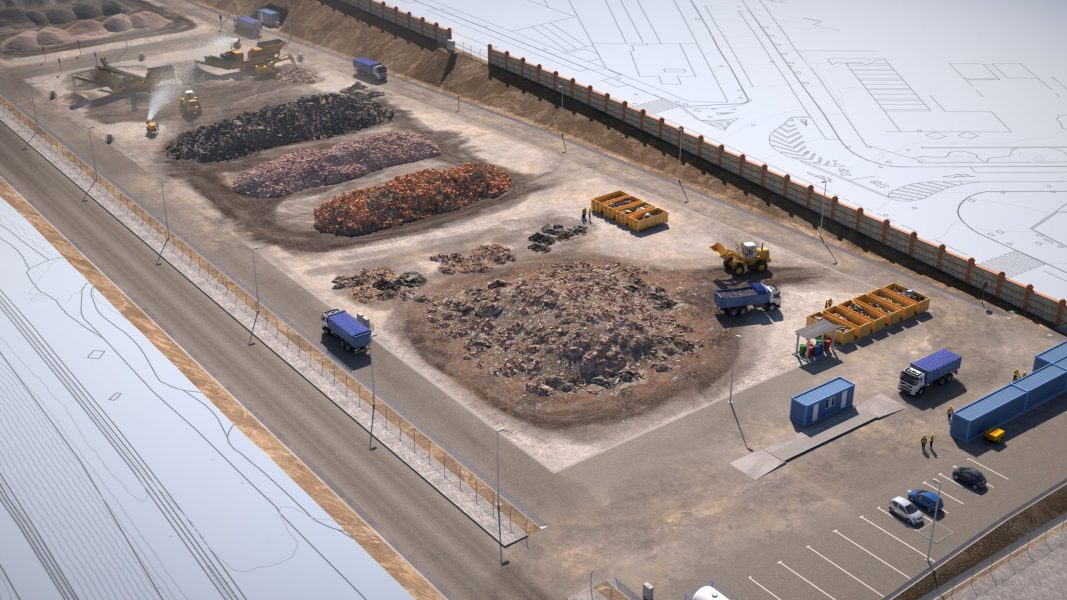29 March 2023
for Madrid Nuevo Norte

Madrid Nuevo Norte aspires to be an international benchmark for its pioneering urban model, centred on people. To this end, the many environmental, economic and social sustainability measures implemented included adopting an innovative strategy based on the circular economy, with the aim of achieving truly sustainable urban development. Work is being done to minimise environmental impact right from the initial construction stage, by reclaiming materials from the dismantling of existing structures and then reusing them in the works of the same project. This initiative–which aims to reduce the carbon footprint of construction waste management by 70%–was presented jointly by Madrid Regional Government and Crea Madrid Nuevo Norte (the main private promoter of the project) on 27 March.
This strategy aims to recycle nearly 90% of the existing materials within the area of action and give them a second life as raw materials for construction. To this end, more than 800,000 tonnes of materials will be reused within the project. As a result of locating the necessary infrastructure for this purpose in the area itself, the traffic caused by shipping materials by lorry through the city will be significantly reduced.
The planned recycling process begins with the selective dismantling of the pre-existing buildings, classifying the waste that will be treated in the plant (stone, ceramic and concrete) and those that will be reused outside the project, such as metals, wood, plastics and glass. The waste will then be transferred to the centralised plant, within the works area, which will have specialised machinery to convert the rubble into new materials. These will then be used, in a coordinated manner, to build infrastructures, streets and parks in Madrid Nuevo Norte. The temporary facility will occupy 38,000 square metres and will be active only for the duration of the construction of the project.

Paloma Martín, consejera de Medio Ambiente, Vivienda y Agricultura y Álvaro Aresti, presidente de CreaMNN, en la presentación de la iniciativa de recuperación de materiales en Madrid Nuevo Norte.
During his speech at the presentation of this initiative, the president of Crea Madrid Nuevo Norte (CreaMNN), Álvaro Aresti, highlighted the importance of this major urban regeneration project ‘that will allow Madrid to become the most attractive city in Europe for entrepreneurship and bringing in investment, talent and activities related to the knowledge economy’, he explained. In Aresti’s words, this project is key for the region not only because of what this urban transformation will mean, ‘but also because of what it will bring to the citizens in terms of jobs, economic prosperity and improvement in their quality of life’.
He also stressed the commitment, shared between Crea Madrid Norte and the Public Administrations, to carry out the most innovative and sustainable urban project.
For Aresti, ‘sustainability cannot be based solely on imaginative solutions, but on medium- and long-term measures, clearly focused on improving the productivity and efficiency of urban development’. He also highlighted the importance of public-private partnerships, exemplified by the Framework Agreement signed in 2021 between the public institutions involved in the project and Crea Madrid Nuevo Norte.
‘This is a great opportunity to transform the region’s economic model, in which innovation and sustainability are clearly aimed at improving the quality of life of citizens and improving the competitiveness and productivity of the capital,’ concluded the president of CreaMNN.
For her part, the Regional Minister for the Environment, Housing and Agriculture, Paloma Martín, presented the technical innovations of this infrastructure, which is designed to treat material from four different urbanisation projects. ‘With it, we are going to recycle and reuse, within the project itself, construction and demolition waste weighing 40 times as much as the Eiffel Tower. We will also avoid extracting a volume of aggregates in our region similar to that of six ponds in the Retiro Park,’ Martín noted.